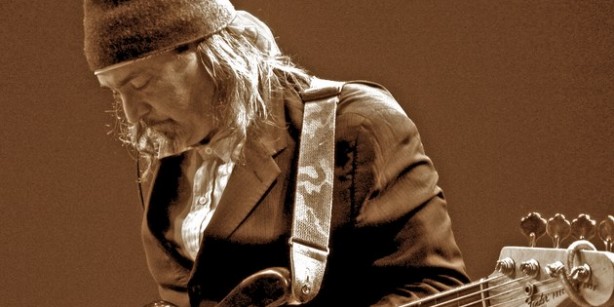 Music
Music
Q & A: Bill Laswell on stumbling into the role of producer, the Occupy movement, and yoga
by Jesse Ship
November 24, 2011
To call Bill Laswell a super-producer is almost an understatement. Skimming through his resume, demi-god seems more fitting. Despite having laid down foundations for too many groundbreaking artists to mention, the bassist by trade remains mostly modest. His clients run the gamut from Herbie Hancock (his album Future Shock, featuring “Rockit,” was all Laswell) Fela Kuti, Peter Gabriel and Sly and Robbie, just to name a few. He even had a few stints in the hard rock world working with Mick Jagger, Iggy Pop, The Ramones, and Motörhead, much to the chagrin of dedicated fans.
Laswell is currently heavily steeped in the new age of world and abstract music these days. His new project is MOD: Technologies — a collective that stemmed out of Methods Of Defiance, a dub reggae super-group mostly consisting of Laswell on bass, drummer Guy Licata, vocalist Dr. Israel, avant-garde trumpeter Toshinori Kondo and Bernie Worrell, pianist for Parliament Funkadelic.
Bill Laswell and MOD: Technologies have just released Dub Arcanium Arcandrum, a remix album of their past two albums, Jahbulon and Incunabula, featuring revisionings from Prefuse 73, Mad Professor, and others.
When you approach a project as a producer, do you view it as a technical project, or is it something that you feel out?
Bill Laswell: Everything is different. I don’t know how to approach it from a technical point. I have to feel it, otherwise I don’t know how to generate a result. It’s all based on how, and if, you feel something. Some of it is more work-related and others are based on a need to create something.
Have you ever had an offer and thought “I just can’t do this?”
Lately I’ve tried to control my own situation, so I don’t necessarily have that happening too much. You might get that if your job is being a producer. I don’t even like that word, I don’t need to be called that. There were things in my life that I felt I needed to accomplish, and along the way, I guess the work came into it where I did things to assist others in realizing their goals. I prefer to stick to my own projects and ways of doing things.
So, is MOD: Technologies a return to your roots?
A little bit, but it’s also futuristic in that it can keep expanding and changing. Personnel can change. Sound and music and interaction with musicians can change, but it’s all about building something, tearing it down, and rebuilding it again. And not getting stuck in the same box. People that join bands at any age tend to stay put and they end up playing the same music their whole lives with the same people. I’ve never had that problem, and it definitely is a problem. I hope that in the future we’re not subjected to this kind of entertainment. It’s more to developing your own gift, mind, or vision. That should be expansive and independent and positive. You should be able to move forwards without too much baggage.
There’s this sort of esoteric, revolutionary and occult reading list on the MOD: Technologies site, what are you trying to say?
That was more like a call out to things you might find interesting. Out of fifty books, films, and records you might find something that expands your repertoire, or is useful to you.
Are the last couple of albums, Jahbulon and Arcanium Arcandrum, referencing secret societies?
Any information or written word, or hidden secrets, codes, symbols, slogans, and philosophies are all scrambled into that. It’s not meant to be one particular directive but it is suggesting to look further, or to look into what is obscure. You can find out about anything, starting with anything.
Do you have any thoughts on the Occupy movement?
I don’t really because I’m not that connected. I understand that people in general as a mass with the common thread that they are broke have a lot of grievances and complaints, and rightfully so. I don’t know what the directive is but hopefully it will have a positive effect on change and not too many people will get hurt. In America, it’s not likely that there will be a mass assassination of people camping out, its probably safer than most countries, but it’s still dangerous. I hope that it will gradually bring about change. But my way is a bit different. I’m not in the tonal world, I don’t connect with all these problems. I just have a way of doing things by working, traveling and creating music. My responsibility is to create art related music. I don’t really connect with protests, I understand it, I don’t disagree with it, but I don’t have time for it.
Your latest release, Arcanium Arcandrum, features remixes of your own and work from guys like Prefuse 73 and Mad Professor. How did you approach the project?
I’ve always considered remix culture as reinterpreting composition, in the way that someone plays the music of a known composer, not so much recreating the sound. I see it as a kind of science, the science of translation, or mutation. I take it quite seriously as a job. Its not just a b-side or a throw away, it matters. With the exception of something that’s perfectly done and captured lived, that’s more like a photograph, songs are things that are open to reinterpretation. 99% of what I do is unfinished work that can have an infinite number of interpretations. The b-sides can continue through the album set.
A lot of your personal work tends to have a blissed out, mellow vibe, and I understand you have produced some Yoga-related albums? Is that something you practice?
I don’t do yoga, but I work with a lot of people who are very successful in that, shall we say, “business.” I respect any routine, practice or system that results in people finding peace. I’ve done a lot of music that you could call meditative or spiritual. If that’s what you want to call it, and it works for that sensibility, then it fits, and that’s positive. There are a lot of positive things you can say about yoga, but I don’t have time for it and it probably doesn’t suit me. I’ve done a lot of music that you could call meditative or spiritual. If that’s what you want to call it, and it works for that sensibility, then it fits, and that’s positive.
Tags: Music, Interviews, News, bill laswell, Fela Kuti, Iggy Pop, Motorhead, Peter Gabriel, The Ramones





